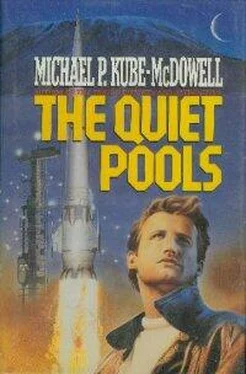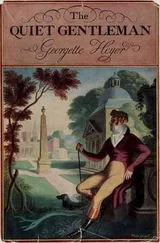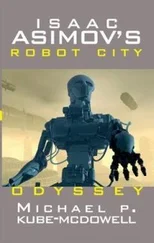“One starship has already sailed.”
“One is not enough,” she said. “One is a frail reed. You must help me, Thomas. Reflect. And then come and tell me what you see, so that I will better know what it is that I must do.”
He sighed, covered her hand with his. “You ask a great deal.”
“From you, as from myself.”
Tidwell squeezed her hand and then freed it. “A question?”
“Of course.”
“Do I carry the Chi Sequence?”
Sasaki answered without hesitation. “I do not know,” she said. “You were never tested. Do you wish to be?”
His breath caught and he looked at her wonderingly. He had expected an answer, not a choice. Tell me yes, tell me no, and then I’ll go away to worry about what it means. To look inside myself as well as my history . Then he saw with sudden insight that he had been given a gift. Yes, yes — what song does your body sing, and where did you first hear it ? It was not something he should have to be told. He would find out for himself.
“I think not,” Tidwell said. “Not yet.”
He could not decide whether he was pleased or annoyed by Sasaki’s approving smile.
CHAPTER 9
—CUA—
“…look on your works and weep.”
The next time Christopher McCutcheon looked up, August had vanished, leaving very few tracks on his consciousness. It had been a nothing-much month, one day folding unnoticed into the next, time evaporating in the summer Texas sun.
Even the aftertaste of July’s crises had faded into gentle memory. His father, conscience or curiosity satisfied by Christopher’s visit, had pursued no further contact. And Christopher’s brief panic over Loi and Jessie subsided as his worst fear—that of being excluded when all three of them were home together— failed to materialize. The worst crisis at Kenning House that month was the discovery of a nest of Formosan termites in the backyard.
But in the world around him, and in the greater world beyond, August had been a busy, sometimes turbulent month. At work, the new front gate was opened, freeing Christopher from dependence on the tram. Thomas Tidwell, titular head of Christopher’s division, made not one but two visits, events rare enough by all accounts to be a curiosity. One of the center’s archaeolibrarians was picked for Memphis’s staff; two others quit, and one—a woman named Barbara Manly—committed suicide, when they learned they were not.
None of those events had touched Christopher more than tangentially. He recalled them with no sense of involvement or emotional investment, not even that which a witness might feel. Not even for Manly. She was an older woman, a fiction and theater specialist, working in a different project circle in a different part of the building. He was a casual spectator, a passive bystander, the distance between him and her death as great as the distance between him and an image on the multimedia.
He wondered at his own reaction. After the first moment of shock, he could find little more than puzzlement inside. Why had she done it? Building the library was a contribution, a way of taking part. Why was that not enough for Barbara Manly? Daniel Keith had cried for her. Christopher had not. He could not sympathize with the incomprehensible.
Too, part of the distance was numbness. There was too much death to grieve over each departed. All month, the news seemed to cater to a morbid, obsessive fascination with the many and varied ways that people find to die. The running blood in the street, the raglike bodies lying crumpled on the savanna, the burned, the broken, those who went fighting, those taken by surprise—they were all ways to touch the untouchable, to hold in one’s hand the idea of one’s own mortality. How will I die? Like this? Like this? How awful, how sudden, how unfair, how noble, how right. How unready I am—
Death. The world was more peaceful than at any time in a century, and yet there was no end to the dying. The Peace Police were back in West Africa, but not before more than three hundred fell in clashes along the Mauritania-Mali border. A fire in Phobos Station killed three astronauts and left the second largest Martian outpost uninhabitable. One of the Global Environmental Watch’s high-altitude ozonator barges fell out of the sky over the Antarctic, condemning three of its crew to a fiery death and the one who succeeded in ejecting to a slower, icy end. And so on.
Christopher watched the news of the airbarge crash cuddled with Jessica on the huge brown family room couch, with Mobius in turn sprawled on Jessica’s lap in one of the classic boneless-cat positions which had earned him his name. It was the last Saturday of the month. He should have been rehearsing for Sunday’s gig; he could have been at an end-of-summer court party at a residential center just three blocks away. But he had the energy for neither.
Besides, Jessica needed the company. Her left foot was sheathed in an air cast and propped on an ottoman. Inside the cast was a freshly broken ankle, painful trophy of yesterday’s spill down a shopping center escalator. And Loi was in Brussels for the debut of a commissioned sculpture at the Alianti Gallery.
So they cuddled together wordlessly, snacking at crackers and cheese, sipping at a fruity Piesporter that one of Loi’s lovers had sent as congratulations. When the news was over, the screen returned to its normal cycling display, now a Brinwell animate of faces in a flickering fire.
“Aargh,” she said. “Switch off.”
The screen blacked, and Jessica sighed relievedly.
“Do you want to watch something else?” Christopher asked, kissing the top of her head. “We have that new Mojembe film in the capture queue.”
“Loi wanted to see that most,” she murmured.
“That’s right,” Christopher remembered. “No point in paying for two showings. Well—what about Loi’s Hearkentime? It’s a good lazy-evening kind of timesculpt, and I’ve only done it once.”
“Are you bored with me?”
He kissed her head again. “Heavens, no. I just didn’t want you to be bored.”
“I like cuddling,” she said. “Mobius and me. We just kind of gravitate to warm places and cuddly people.”
“McCutcheon Heat Friction, Ltd.,” he said in an affected voice. “You’ve come to the right place, ma’am. No client too female or too furry.”
“What if they’re female and furry?”
“There’s a surcharge.”
She chuckled and snuggled closer. “Chris?”
“What?”
“Can you get into the library from here?”
“The Memphis library?”
“Um-hmm.”
“No,” he said. “There are no external ports to the system. For security. I wish there were. Some days I’d like to be able to work at home like a normal person.”
“If you could work at home, you two’d have stayed in San Francisco, and then I’d never have met you.”
“True. I’ll try to remember that the next time I trudge off to work feeling like a tradesman instead of a professional.”
“What was that you were doing this morning?” He had spent three hours in Loi’s office after breakfast.
“Logs and mail and such,” he said. “Documentation. That’s different. Different system. Why?”
“I was just wondering if you could look me up.”
“Hmm?”
“In the library. I was just wondering what it said about me.”
“Oh,” he said. “No. I can’t do that from here.”
She twisted her neck to look up at him. “Can you do it Monday? When you go in?”
He looked down into her eyes curiously. “I could. Why does it matter? What made you think of this?”
“I don’t know,” she said, turning away from his scrutiny and resting her cheek on his chest. “I guess I just wondered what they’d know about me, when they’re living out there wherever. Do you think I’m in it?”
Читать дальше

![Nick Cracknell - The Quiet Apocalypse [= Island Zero]](/books/28041/nick-cracknell-the-quiet-apocalypse-island-zero-thumb.webp)










